Food safety compliance software is not optional anymore. It's how multi-unit operations maintain standards, pass health inspections, and avoid violations that cost thousands in fines and reputation damage.
The challenge?
Most food safety apps excel at one thing but miss the bigger picture. One platform has great checklists but no temperature monitoring. Another handles HACCP plans but can't track corrective actions across locations.
The best food safety software in 2026 links daily operations directly to compliance. It gives frontline teams easy-to-use mobile tools and lets managers see real-time performance across all locations.
This guide highlights the 6 best food safety compliance software solutions and helps you pick the right one for your business.
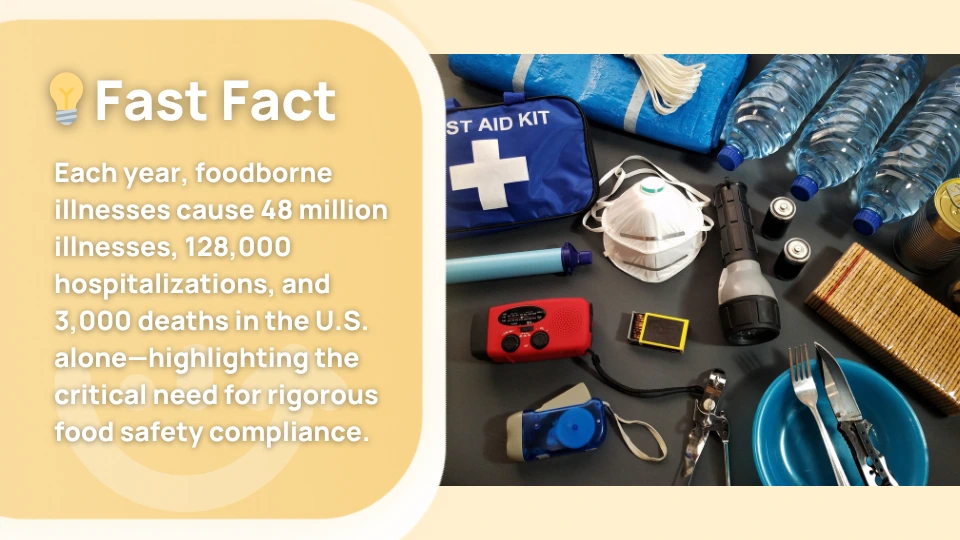
6 Best Food Safety Software Companies Compared
**
Rank, Platform, Category, Best For, Key Differentiator
#1, Xenia, Complete Operations + Food Safety, Multi-unit restaurants/C stores/hospitality managing 20+ locations, Integrated operations platform with AI analytics and performance benchmarking
#2, FoodDocs, AI-Powered HACCP Builder, Small-to-medium businesses establishing digital HACCP programs, AI creates comprehensive HACCP plans in hours instead of weeks
#3, FoodReady, Food Processor Compliance, Manufacturing and processing facilities, Batch tracking with complete ingredient traceability
#4, SafetyChain, Enterprise Quality Management, Large manufacturers across multiple facilities, Statistical process control with advanced analytics
#5, Safe Food Pro, Multi-Location Chains, Restaurant chains needing standardized procedures, Real-time monitoring with customizable checklists
#6, Smart Food Safe, HACCP-Focused Management, Operations where HACCP is primary compliance concern, Step-by-step HACCP builder with supplier integration
**
.svg)
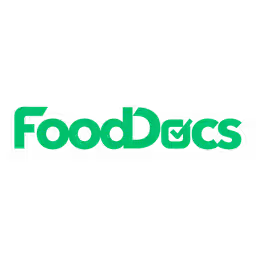
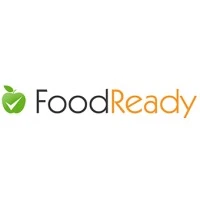
1. Xenia - Best Food Safety Compliance Software for Multi-Unit Operations
.webp)
**
Attribute, Details
Best use case, Multi-location food safety compliance across restaurants hospitality and convenience stores
G2 rating, 4.9/5
Key clients, Demos Restaurants - Slim Chickens - Power Market - Shucking Good Hospitality - Prince Street Pizza - Dominos
Differentiator, Complete operations platform integrating food safety/maintenance/task management/AI-powered analytics
**
Xenia is the best food safety compliance software for multi-unit operations managing 25-100+ locations across restaurants, hospitality, and convenience stores.
Unlike standalone food safety apps, Xenia treats compliance as part of complete operational excellence. Temperature monitoring sits alongside opening checklists, equipment maintenance, and performance tracking in one mobile-first platform.
Managers get real-time visibility into food safety compliance across all locations. Frontline teams get intuitive mobile tools that make compliance repeatable without creating an administrative burden.
How Xenia Helps Businesses Maintain Food Safety
Automated HACCP Documentation: Xenia automatically creates HACCP docs. Digital checklists enforce critical control points, Bluetooth sensors log temperatures with timestamps, and audit-ready reports are ready instantly.
AI-Powered Food Safety Audits: Xenia uses AI to score audits and analyze photos for violations like improper storage, cross-contamination, or temperature issues. When gaps are found, corrective actions are triggered automatically and tracked to completion.
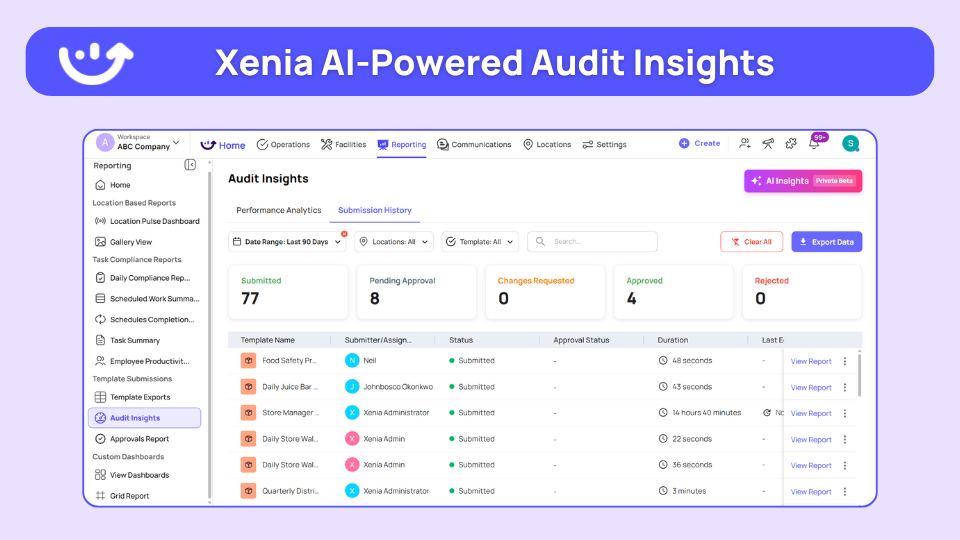
Integrated Temperature Monitoring: Bluetooth sensors sync automatically to daily workflows. Alerts notify managers when readings fall out of safe ranges, and work orders for maintenance are created automatically. Continuous temperature monitoring helps catch equipment failures before products spoil.

Corrective Action Workflows: Violations are not just logged with Xenia; they get fixed. Tasks are assigned with deadlines, require photo proof, and need manager approval before closing to ensure accountability.
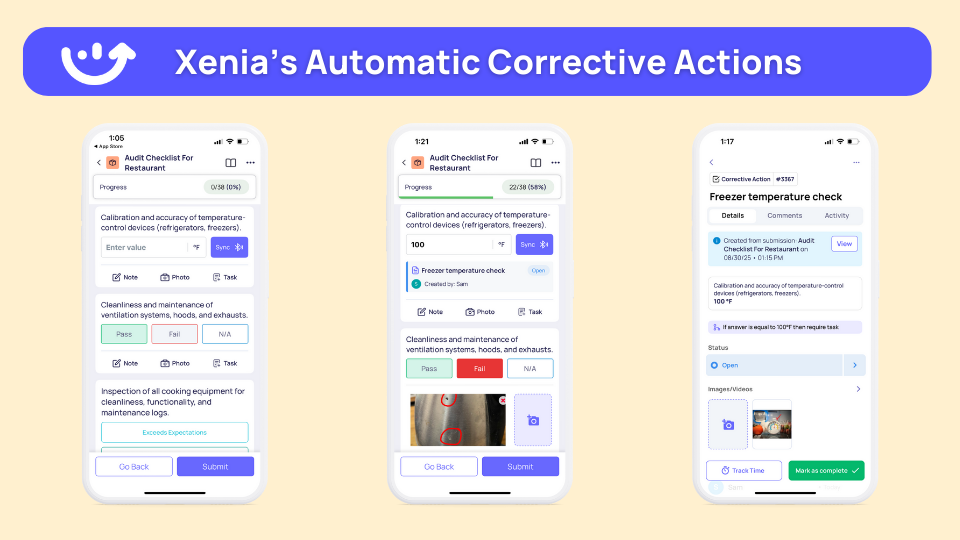
Real-Time Multi-Location Visibility: Leaders can see compliance across all locations, checklists, temperature stats, open tasks, and audit scores, so they can act before small issues become health violations.
Performance Benchmarking: Compare locations easily. Xenia's analytical agent answers questions like "Which stores have the most violations this month?" and turns data into actionable insights without needing technical expertise.
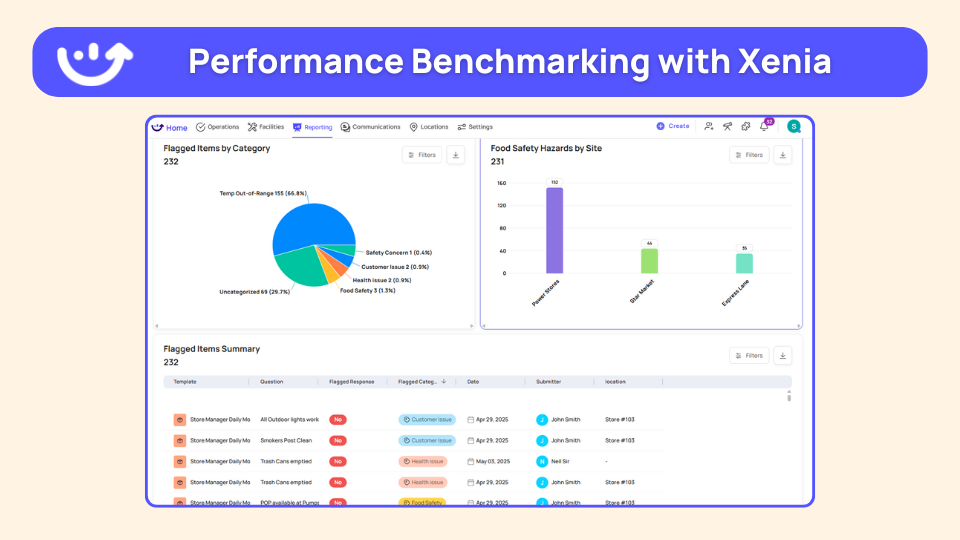
Predictive Analytics: AI summarizes trends across audits, temperatures, and task completion. Patterns emerge early, so executives can prevent small issues from turning into bigger problems.
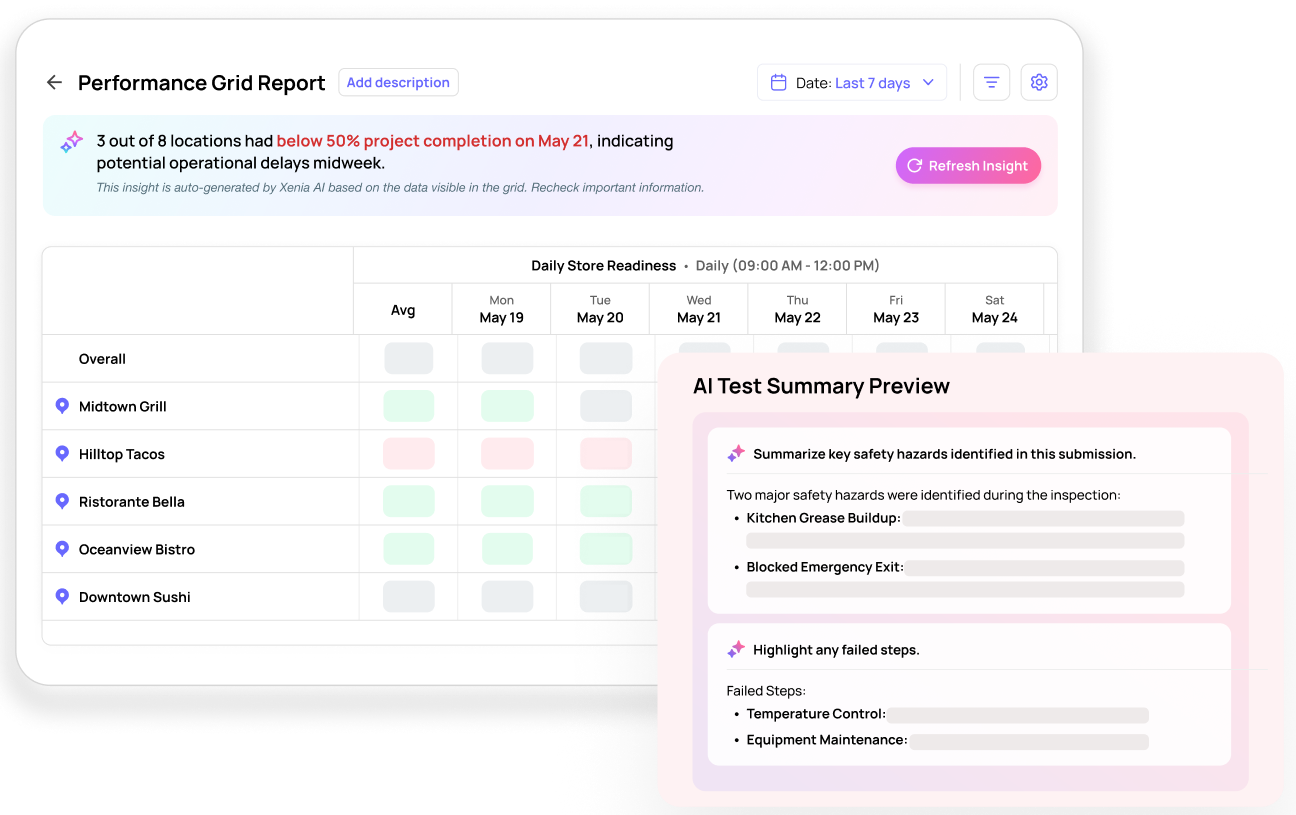
How Xenia Compares to Standalone Food Safety Apps
What You Need, Xenia, Standalone Food Safety Apps
**
Best for, Multi-unit operations needing integrated compliance, Single-location or compliance-only needs
Scope, Food safety + operations + maintenance + analytics, Food safety documentation only
Temperature monitoring, Integrated with IoT sensors and work orders, Often separate system or manual entry
Corrective actions, Automatic task creation with forced resolution, Manual follow-up required
Multi-location analytics, Cross-location benchmarking and trend analysis, Location-by-location reporting
Mobile experience, Built for deskless workers & works offline, Varies by platform
Deployment time, 1-2 weeks & no IT resources needed, Varies widely
**
Standalone food safety apps excel at HACCP documentation and compliance checklists. Xenia excels when you need food safety integrated with complete operational execution, temperature monitoring connected to equipment maintenance, compliance audits linked to performance benchmarks, and corrective actions that actually drive resolution.
Learn more: Xenia Food Safety Software
.svg)

Priced on per user or per location basis
Available on iOS, Android and Web
2. FoodDocs

**
Attribute, Details
Best use case, Small-to-medium operations establishing digital HACCP programs
Key strength, AI creates comprehensive HACCP plans in hours instead of weeks
**
FoodDocs uses AI to simplify HACCP plan creation and maintenance, making it ideal for businesses transitioning from paper to digital food safety management systems.
Key Features:
- AI-powered HACCP plan builder with hazard analysis
- Customizable monitoring tasks with verification requirements
- Food traceability management for recall readiness
- Secure cloud storage with 24/7 access
- Mobile app for iOS and Android
- Audit checklist creation and management
3. FoodReady

**
Attribute, Details
Best use case, Food processing and manufacturing facilities
Key strength, Batch tracking with complete ingredient traceability
**
FoodReady offers all-in-one food safety and quality management software designed for food processors and manufacturers to help them stay compliant at every stage of production.
Key Features:
- Drag-and-drop HACCP plan builder
- Batch tracking and ingredient traceability
- Supplier management with performance tracking
- Customizable monitoring tasks
- Training modules for staff certification
- Secure record storage with version control
4. SafetyChain

**
Attribute, Details
Best use case, Large food manufacturers across multiple production facilities
Key strength, Statistical process control with advanced data analytics
**
SafetyChain delivers enterprise-grade food safety and quality management software, built for large manufacturers that need robust compliance and quality assurance tools.
Key Features:
- Supplier quality management with vendor scorecards
- Statistical process control for quality monitoring
- CAPA (Corrective and Preventive Actions) management
- Audit management with scheduling and documentation
- Advanced data analytics for trend identification
- Document control with version management
5. Safe Food Pro

**
Attribute, Details
Best use case, Restaurant chains needing consistent procedures across distributed locations
Key strength, Real-time monitoring with customizable drag-and-drop checklists
**
Safe Food Pro offers easy-to-use food safety management software for businesses of all sizes, from single-location restaurants to multi-site operations.
Key Features:
- Digital food safety record management
- Customizable checklist builder (drag-and-drop)
- Real-time compliance monitoring
- Audit preparation tools and comprehensive reports
- Mobile app for on-floor task completion
- Multi-location management capabilities
6. Smart Food Safe

**
Attribute, Details
Best use case, Operations where HACCP is the primary compliance concern
Key strength, Step-by-step HACCP builder with supplier integration
**
Smart Food Safe delivers focused HACCP management software for food manufacturers and processors, with strong tools for compliance and traceability.
Key Features:
- Step-by-step HACCP plan builder
- Customizable audit templates
- Supplier management integration (Smart Supplier)
- Document control with version management
- SQF certification support tools
- Real-time compliance monitoring
FAQs
What are the top food safety software solutions for multi-unit operations?
If you manage multiple locations, Xenia helps you handle operations and compliance in one place. It’s the best food safety manager software.
What features should I look for in food safety compliance automation?
Look for software that automates HACCP documents and sends real-time temperature alerts. It should have workflows that fix problems and mobile access that works offline. Customizable checklists, traceability, and secure storage are also important. If you have multiple locations, it should track performance and create work orders automatically.
How does food safety compliance software improve health inspection outcomes?
The software keeps accurate records and sends alerts when issues occur. It helps fix problems before inspections and provides reports that are ready anytime you need them.
Can food safety apps integrate with existing restaurant systems?
Yes, modern apps connect with the systems you already use. Xenia can pull data from HR systems like Workday or ADP, link to POS systems, connect to temperature sensors, and feed information into BI tools like Power BI or Tableau.
What is the difference between food safety software for restaurants vs manufacturers?
Restaurant software focuses on daily operations like checklists, shifts, temperature monitoring, and local compliance. Manufacturing software handles batch tracking, supplier quality, process control, and certifications like SQF or BRCGS, and is usually more complex.
Conclusion
For small-to-medium businesses starting digital HACCP programs, FoodDocs uses AI to make the switch from paper easy.
Food processors and manufacturers can rely on FoodReady, SafetyChain or Smart Food Safe for production-level compliance, batch tracking, and certification support.
For multi-unit operations with 20+ locations, Xenia is built for deskless teams. It combines temperature monitoring, HACCP docs, corrective actions, equipment maintenance and AI analytics, all in a mobile-first system that deploys in 1-2 weeks.
Schedule a demo to see how Xenia turns food safety compliance into operational excellence for your frontline teams.
Frequently Asked Questions
Got a question? Find our FAQs here. If your question hasn't been answered here, contact us.

Looks like there's no data available in our FAQ section at the moment.

.svg)
.webp)
%201%20(1).webp)





.webp)

.svg)
%201%20(2).webp)
.webp)
.png)








